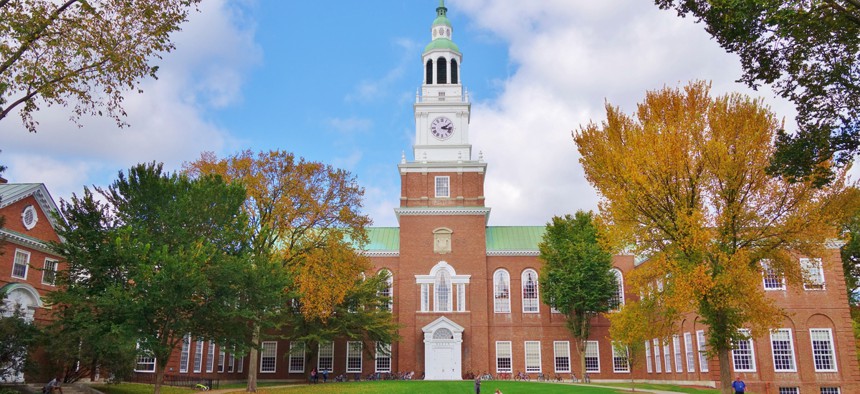College Students in One State Will Still Get to Vote There, Even if They’re Learning Remotely in a Different State

Dartmouth College in Hanover, New Hampshire. Shutterstock
New Hampshire will allow some college students who attend school in the Granite State to cast ballots there, even if remote learning has them living in their home states.
Many college students who attend school in New Hampshire are still eligible to vote in the state, even if the pandemic has forced them to learn remotely from another state.
That’s potentially a big deal. In a state where elections are often won by razor thin margins—Hillary Clinton won the state by 2,736 votes in 2016, the same year a U.S. Senate seat was decided by 1,017 votes—ballots from remote students can be meaningful.
On Wednesday, the New Hampshire attorney general’s office rejected a request from the state Republican party to bar college students from voting in the state if they are learning remotely from their home state during the coronavirus pandemic. Republicans had argued that “students who do not live here and have no residence here at the time of the election are not qualified voters” and should not be able to cast votes on statewide issues.
They asked that the AG issue guidance to local election officials to “not permit out-of-state remote learners to register to vote without confirming a current (up-to-date) residential address and domicile in New Hampshire” and to “not send absentee ballots out of state to remote learners without confirming a current residential address and domicile in New Hampshire.”
In the 2016 election, only 1% of New Hampshire voters cast their ballot using an out-of-state ID—but that number rose to 36% among the 2,744 college students who voted.
The attorney general’s office said that out-of-state college students can continue voting in the state as they have been—as long as they’ve already established a “a physical presence” in the state, meaning incoming freshmen whose college experience has been entirely online so far are not eligible to vote. “Once a student lawfully establishes domicile in New Hampshire under [state law RSA 654:1], the student does not lose his or her domicile due to temporary absence,” Assistant Attorney General Nicholas Chong Yen said.
That state law, which in recent years has been subject to a protracted legal battle, states that anyone, including college students, can claim a domicile in the state for voting purposes as long as they can prove residence through a piece of official mail sent to their current address or an unexpired lease. They don’t necessarily have to be a “resident” as defined by a New Hampshire driver’s license.
Because New Hampshire is so small, college students constitute 11% of the population, making them a significant voting bloc. Many of these students were born and raised in New Hampshire, so their voter registration isn’t a matter of dispute—but New Hampshire voting rights for thousands of out-of-state students have been hotly debated for years.
In 2017, Republicans in the state legislature passed a law changing the documents needed to prove residency for voter registration, a measure that was eventually struck down by a state Superior Court judge. In 2018, the state legislature passed a new law redefining what “resident” and “residency” mean and tried to require out-of-state students to obtain a New Hampshire driver’s license and register their cars in the state to prove residency for upcoming elections. Students across the state found the change confusing, and during the state’s primary season, many were unsure whether they could vote in New Hampshire or would have to vote instead in their home states.
Two undergraduate students at Dartmouth College sued over the law, with lawyers from the ACLU arguing that the new requirements amounted to a poll tax. The state Supreme Court determined in May that college students do not have to be residents of the state to vote there, only “domiciled” in New Hampshire, meaning the change to the residency definition would not affect voting rights.
“Election laws do not establish motor vehicle or driving privileges and obligations, nor do the motor vehicle laws establish voting eligibility,” the court wrote in its decision. “A person is an eligible voter in this state if they live in New Hampshire and have manifested the requisite intent.”
In response to the latest update on voting rights from the attorney general, the state Republican Party asked for clarification of how the state was defining the establishment of a domicile. “If moving out of the state, maintaining no abode in New Hampshire and being eligible to register to vote in another state do not categorically establish a domicile elsewhere, it is difficult to imagine what would,” the group wrote in a letter to the attorney general’s office.
The Republican Party did not threaten legal action in their response, but in their original letter to the attorney general’s office, they wrote that they “would strongly prefer … to avoid the disruption of litigation so close to the election if possible.”
The state Democratic Party in turn accused Republicans of pulling “out every trick in their voter suppression playbook to stop people who don't agree with them from voting.” College towns in New Hampshire, as in many states, skew heavily Democratic.
The ACLU had also cautioned that barring out-of-state college students would “inject chaos and confusion into the final two weeks of voting.” Henry Klementowicz, staff attorney at the ACLU of New Hampshire, said that “more than 136,000 people have already returned absentee ballots in New Hampshire, including college students … changing any voting guidance would cause needless confusion in an already unprecedented election process.”
Emma Coleman is the assistant editor for Route Fifty.
NEXT STORY: Mail-in ballot applications peppered with accessibility issues






